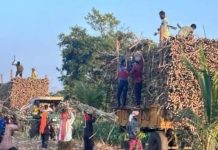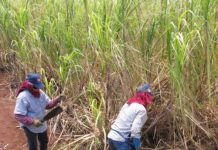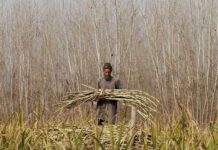Sugarcane farmers were encouraged to embrace chemical-free farming practices by combining their traditional knowledge with modern natural farming techniques during a training session held by the ICAR-Sugarcane Breeding Institute, Coimbatore, on 9th July 2025, according to the Press Information Bureau.
The ICAR-Sugarcane Breeding Institute (ICAR-SBI) organized a training program titled ‘Sugarcane Farming for Prosperity’ for tribal farmers from Karumanthurai in Salem district. This event was part of the ‘Development Action Plan for Scheduled Tribe Component (DAPSTC)’ project and took place at the Institute’s Coimbatore campus. In addition, a Farmer-Scientist interaction for the participants of the ‘Farm School on All India Radio’ (FSA) from across the state was also held on the same day.
M. G. Ganesan, Project Director of Project Nilgiri Tahr, Govt. of Tamil Nadu, spoke at the event and highlighted the advantages of adopting chemical-free farming. He cited the success of the Kaani tribals in Tirunelveli district as an example. He also praised ICAR-SBI for its outreach efforts within the Anamalai Tiger Reserve, where the institute worked closely with indigenous tribes and collaborated with the forest department to ensure that ecological and environmental balance was maintained. He noted that this intervention model could be a useful template for other organizations.
In his presidential address, Dr. P. Govindaraj, Director of ICAR-SBI, emphasized the success of the ‘Farm School on Sugarcane Farming for Prosperity,’ conducted in partnership with All India Radio, Coimbatore. He pointed out that the continued participation of sugarcane farmers from distant areas of Tamil Nadu in the Farmer-Scientist interaction demonstrated that radio remains a powerful tool for agricultural communication, even in today’s digital age. Dr. Govindaraj expressed hope that such training sessions would lead to a significant improvement in the state’s sugarcane farming practices. He also commended the DAPSTC team for their efforts in reaching remote tribal communities and extended his gratitude to the Tamil Nadu Forest Department and Tamil Nadu State Rural Livelihood Mission for their unwavering support in implementing the project.
Dr. D. Puthira Prathap, Principal Scientist and Nodal Officer of the DAPSTC Project and Farm School on AIR, noted in his opening remarks that over 1,250 tribal households from six indigenous communities (Malasar, Malamalasar, Oorali, Malayali, Kurumbar, and Irular) across four districts in Tamil Nadu and Kerala have benefited from the DAPSTC project. The initiative has been successfully implemented in areas including the Anamalai Tiger Reserve, Sathyamangalam Tiger Reserve, Eastern Ghats of Salem district, and Attappady hills in Kerala.
Dr. Prathap highlighted that the project not only focused on physical interventions but also aimed at knowledge-sharing and promoting self-reliance. He encouraged tribals interested in adopting chemical-free farming to take advantage of relevant government schemes. He also praised the effectiveness of traditional radio, which continues to be a trusted medium in rural areas. The active participation of listeners in the ‘Farm School on All India Radio’ interaction demonstrated the continued relevance of radio as a vital tool for agricultural education.
In addition to the training sessions and the farmer-scientist interaction, the farmers were taken on a tour of sugarcane fields featuring popular sugarcane varieties. They also observed machinery and visited a demonstration unit for sugarcane-based integrated farming systems. Power tillers and battery-operated sprayers were distributed to two tribal settlements, Molayanoor and Vilampatti in Salem district. A video titled ‘Empowering Tribals: Transforming Lives’ was also showcased during the event. Registered sugarcane growers from Subramaniya Siva Co-op Sugar Mills Ltd., Dharmapuri, and Bannari Amman Sugars Ltd., Erode, participated in the program.
(Source: PIB)


















